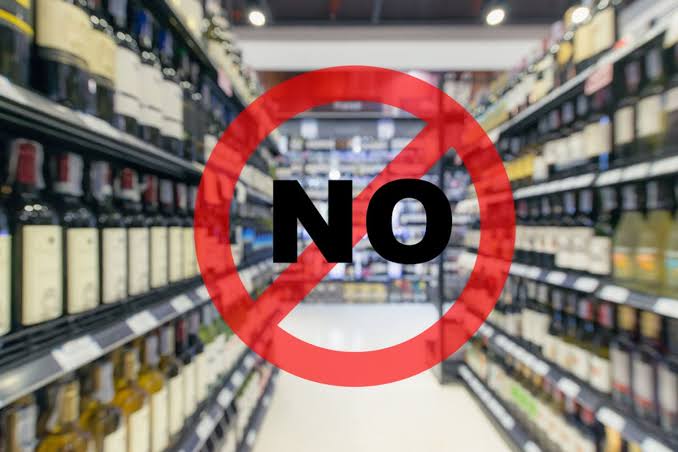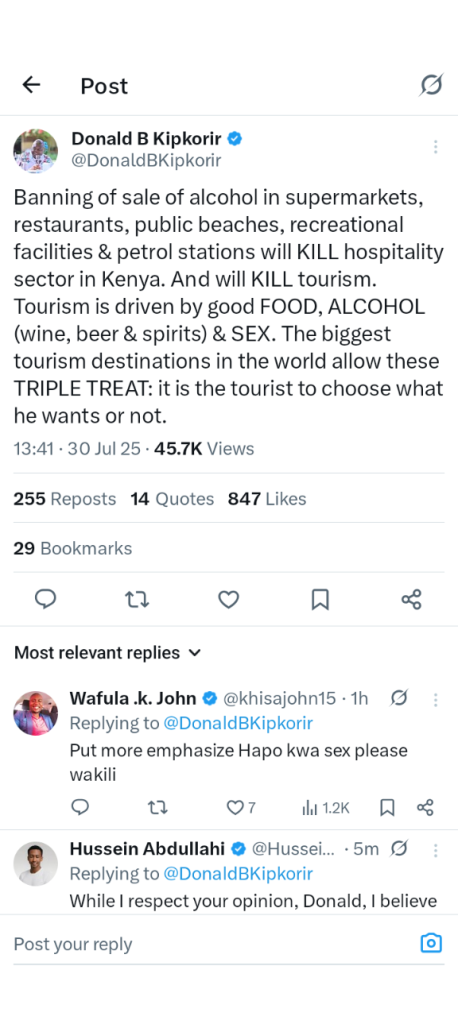OPINION | Donald Kipkorir: Alcohol Ban Will Cripple Kenya’s Soul — Tourism, Food, and Freedom

By Burton | Editor, Good Morning Kenya
Nairobi: 30/7/25
When flamboyant lawyer and political firebrand Donald Kipkorir speaks, people pay attention — and this time, he’s raised the red flag over what could be one of the most far-reaching policy overhauls in Kenya’s social and economic life.
Reacting to the government’s radical new direction on alcohol control, Kipkorir did not mince words:
“The banning of alcohol sales in supermarkets, restaurants, public beaches, recreational facilities, and petrol stations will kill the hospitality sector in Kenya — and kill tourism,” he posted on social media.
And he’s not wrong.

A New Policy — or a New Prohibition Era?
The uproar follows the unveiling of a sweeping new policy dubbed the National Policy for the Prevention, Management & Control of Alcohol, Drugs & Substance Abuse, released in July 2025 by the Ministry of Interior and National Administration.
Framed as a response to Kenya’s deepening alcohol and drug abuse crisis, the policy proposes sweeping restrictions that could fundamentally transform — or cripple — how alcohol is sold, marketed, and consumed across the country.
Among its most controversial proposals:
- A total ban on alcohol sales through supermarkets, online platforms, home delivery services, vending machines, and in residential premises.
- No alcohol in public spaces — including beaches, parks, petrol stations, and bus stops.
- A raised minimum legal age for alcohol consumption and handling from 18 to 21 years.
- Strict exclusion zones prohibiting alcohol outlets within 300 metres of any school or institution of learning.
- Restricted operating hours for all alcohol-selling premises.
- Mandatory health warning labels, standardised packaging, and a minimum bottle size of 250ml.
- A full ban on price promotions, happy hour offers, and “all-you-can-drink” deals.
Advertising Blackout and Cultural Fallout
The policy also proposes what amounts to a near-total blackout on alcohol advertising and branding:
- A ban on all advertising between 5:00 a.m. and 10:00 p.m. across audiovisual media — including foreign broadcasts.
- Online advertising and influencer promotions to be banned entirely.
- No celebrity endorsements, sports sponsorships, or branded teams.
- Outdoor advertising will be prohibited near schools, residential areas, or on government-owned property.
- Content that glorifies alcohol use or mocks sobriety will be strictly outlawed.
The Numbers Are Grim — But Is This the Solution?
A 2022 NACADA survey cited in the policy reveals a grim picture: 1 in every 6 Kenyans, or 4.7 million people aged 15–65, use at least one substance. Alarmingly, some children reportedly initiate tobacco use at just six years old, and alcohol at seven.
These figures demand urgent intervention — no question. But the strategy now on the table resembles a blunt-force prohibition rather than a balanced public health response.
Kipkorir: Don’t Sanitize Tourism Out of Existence
Kipkorir, never one to tiptoe around the uncomfortable, put it plainly:
“Tourism is driven by good food, alcohol (wine, beer, and spirits), and yes — sex.”
Unapologetically provocative? Yes. Incorrect? Not at all.
Kenya’s tourism economy is more than wildlife and landscapes — it’s about experience, vibe, and freedom. Visitors don’t come here for rules and restrictions. They come for the coastal breeze, good food, entertainment, and nightlife. The same can be said for countless locals whose livelihoods depend on this rhythm.
If this policy goes forward unamended, the impact will be seismic: from hoteliers and bar owners to musicians, event organisers, drivers, and delivery workers — an entire economic and cultural ecosystem stands to lose.
Opinion: We Need Smart Laws, Not Moral Panic
Yes, Kenya has a substance abuse problem. But solving it shouldn’t mean setting fire to jobs, culture, and personal freedom. Smart regulation can reduce harm. Sweeping bans will only fuel black markets, kill businesses, and alienate millions.
What we need is a mature national conversation, not a moral crusade disguised as policy.
Donald Kipkorir has sparked the debate — and he’s right to. The question now is whether the government is willing to listen before it legislates Kenya’s hospitality and tourism sectors into extinction.






